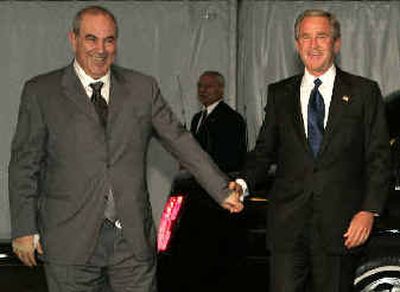Bush defends invasion of Iraq

UNITED NATIONS – President Bush gave an unflinching defense of the U.S. invasion and occupation of Iraq to the U.N. General Assembly Tuesday, arguing that in an age of terrorism “there is no safety in looking away.”
Greeted with a cool response from delegates from the world body’s 191 nations, Bush did not employ the defiant tone he used when he called for Iraq to be forced to disarm two years ago. But he gave no hint of remorse for a war that U.N. Secretary-General Kofi Annan last week called “illegal.”
Noting the U.N. Security Council unanimously threatened Iraq with “serious consequences” in November 2002 unless it complied with U.N. weapons inspectors, Bush said: “The commitments we make must have meaning. When we say serious consequences for the sake of peace, there must be serious consequences.”
Referring to the bloody chaos that has beset Iraq in recent weeks, he said: “The proper response to difficulty is not to retreat. It is to prevail.”
The United States led an invasion of Iraq in 2003 without explicit U.N. backing after diplomatic efforts at the world body broke down. Annan, in a speech before Bush’s address, referred to a war that most U.N. ambassadors still feel lacked international legitimacy.
“Those who seek to bestow legitimacy must themselves embody it, and those who invoke international law must themselves submit to it,” Annan said.
Bush argued that the U.S.-led operation to remove Saddam from power “delivered the Iraqi people from an outlaw dictator.” But Swiss President Joseph Deiss, in a speech to the assembly, spoke for many: “In hindsight, experience shows that actions taken without a mandate … are doomed to failure.”
Bush also stressed a theme that White House officials say is key to his re-election chances: that efforts to build democracies in Iraq and Afghanistan are central to success in the larger war on terrorism.
On Monday, Sen. John Kerry gave a scathing critique of Bush’s decisions on Iraq, accusing him of “colossal failures of judgment” and arguing that the Iraq campaign has made the United States less secure.
Bush disagreed. “Instead of harboring terrorists, they are fighting terrorist groups,” Bush said of Iraq and Afghanistan as Iraqi Prime Minister Ayad Allawi and Afghan President Hamid Karzai looked on.
Bush’s meetings with some of the 64 presidents and 25 prime ministers gathered here reflected the administration’s anti-terrorist focus. Besides Allawi, Bush met with Karzai and Pakistani President Pervez Musharraf – not with traditional European allies such as France and Germany, who opposed the war.
Bush also used his speech to highlight other uses of U.S. power that are more popular with U.N. delegates, as well as swing voters at home. He highlighted increased U.S. funding to fight poverty and AIDS abroad, labeled oppression of settlers in western Sudan a “genocide” and called for a new U.N. fund to promote democracy throughout the world.